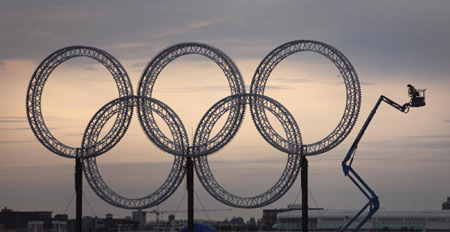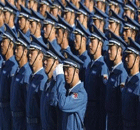About Vancouver
Vancouver weather always a wildcard
(Agencies)
Updated: 2010-01-29 14:59
 |
Large Medium Small |
VANCOUVER - The Canadian government will spend C$13.4 million ($12.8 million) to track one of the "world's most complex weather systems" but trying to predict what Mother Nature might do during the Vancouver Winter Olympics is a roll of the dice.
|
 A workman uses a crane to replace bulbs on the Olympic rings sitting in the harbour of Vancouver, British Columbia January 28, 2010. The large set of rings are sitting on a barge anchored just off the waterfront of the city and are lit up at night in readiness for the 2010 Olympic Winter Games which begin February 12. [Photo/Agencies] |
"We can train, we can install the equipment, but the weather always has the last word in what happens," David Jones, Environment Canada meteorologist, told reporters on Thursday during a briefing on preperations for the Games.
"We're subject to extreme events, we're subject to new types of weather systems we have not seen before, so we're going to try to do the best job we can to forecast the weather but it is always a challenge in this type of environment."
The hottest January on record in Vancouver has made the Winter Games' weather the hot topic in the build-up to the February 12 opening ceremonies -- the first to be held indoors because of Vancouver's notoriously wet climate.
Already the warmest city to host a Winter Games, Vancouver has felt more like a city getting ready to stage a Summer Olympics as record-smashing temperatures and relentless rain eat away at precious snow.
The major trouble spot for organisers is the Cypress Mountain venue, located just north of Vancouver, where more than 100 people are working around the clock to prepare the site for the snowboarding and freestyle skiing competitions.
Cypress has always been seen as a potential headache for the Olympics. Fog and rain disrupted a World Cup freestyle skiing event there in 2008 and the World Cup snowboarding parallel giant slalom race had to be cancelled last year.
EVIDENCE BEFORE YOUR EYES
From Environment Canada's Storm Prediction Centre on the 18th floor of a downtown Vancouver office tower you do not need the millions of dollars of state-of-art equipment to see the problems plaguing Cypress Mountain.
Looking out across Burrard Inlet at the mountains, forecasters can see the receding snow on Cypress and watch helicopters ferry bales of hay up the mountain to help build a base for the skiing and snowboarding courses.
"They have been told they are in tough spot since the beginning of the month given the forecast," said Jones. "At Cypress Bowl it has been shockingly warm ... temperatures have exceeded the freezing point every single day this month.
"We're on track to set a record for the warmest January on record in Vancouver and the records go back to 1937.
"The mean temperatures for the month looks like it is going to end up at around 7 degrees Celsius.
"We are more-or-less shattering the record."
While Vancouver organisers have remained cool in the face or rising temperatures alarm bells have started to sound with forecasters saying there is no relief in sight.
BLAME EL NINO
An El Nino, a periodic warming of the tropical Pacific Ocean that affects global weather patterns and occurs only once every two to seven years, is creating havoc with Vancouver weather and is expected to remain in the area through the Spring, pushing temperatures even higher.
El Nino's impact can be seen in the mountains and on Vancouver streets where sidewalk cafes are doing brisk business, convertibles cruise by with their tops down and joggers have swapped sweatpants for shorts.
"It looks like it is going to be more of the same old story," said Jones. "Latest update on the El Nino is basically it's here and it's sticking around.
"But there is more than just El Nino going on here.
"We've had the double whammy of bad luck for 2010. We've had the affect of El Nino plus the bad luck of that natural variability swinging towards the warm end that has set us on record territory for January."







